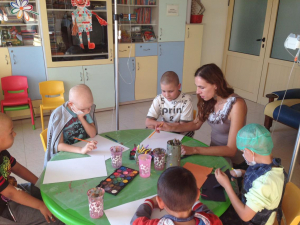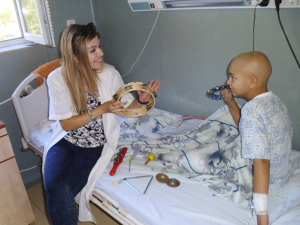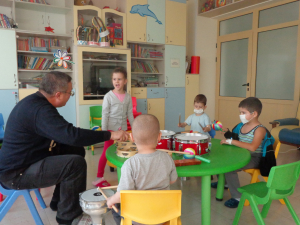
ARTON PROGRAM - The therapeutic power of the group
Creative projects involving group work - general musical performance or group painting, collage, sculpture - are useful in helping to explore and strengthen social...

The subjective, human experience of emotions is comprised of a wide, colorful continuum of feelings.
The journey begins the day we are born and continues until the day we leave this earth. How we effectively handle the full spectrum determines our emotional health.
Some people are adept at navigating this complicated world of human emotion, and some people struggle with expressing their feelings in a healthful way. Disruption in the full expression of emotion is connected to ill health.
Read on to discover the science of emotional health and how you too, can be a healthy emotional navigator.
Emotional health is a person’s ability to accept and manage feelings through challenge and change. Someone who is emotionally healthy can allow their emotions to be digestible. The mundane hassles of daily life offer opportunities to practice responses, rather than reactions to allow emotional health to flourish.
Overall health includes physical, emotional, intellectual, social, and spiritual aspects. When they are in balance and alignment, human beings thrive. Each of these areas of life will influence the others.
Emotional health includes both emotional intelligence and emotional regulation. When the subjective experience of emotions is appropriate over a sustained period, emotional health is thought to be present. Positive affect will be apparent in mundane, daily activities.
The construct of emotional wellbeing lies within the broader understanding of mental health. The lack of emotions does not equal emotional health, just as the lack of mental illness does not equal mental health. Someone suppressing emotions, especially from childhood, may not be as emotionally healthy as someone vulnerable enough to express their emotions.
Daily life offers a continuous series of ups and downs. Like ocean waves, our days come with highs and lows. An emotionally healthy individual will be able to ride the waves of feelings without getting stalled or creamed by a big, emotionally disruptive wave.
Taking into consideration differences in material wealth and individual life circumstances is important. Having financial means to more efficiently self-manage emotions makes emotional health more easily attainable. Environmental factors do influence the abilities to express feelings.
Emotional distress leaves people susceptible to physical illness. Some studies have shown that ailments like cardiovascular disease and immune system repression can be linked to emotional distress (Stewart-Brown, S., 1998). Studies on emotional distress and the underlying neurological circuitry indicate a connection with substance abuse and other dysfunctional behaviors (Sinha, R. et al., 2004).
There is potential emotional distress around every corner. A person who practices a healthy emotional lifestyle will be better able to handle that big wave when the swell builds. Like a physically healthy lifestyle, the long term benefits are abundant.
Self-awareness is a characteristic of emotional health. An emotionally well person can look at the self and redirect emotions, when needed, to navigate distress or elation.
This ability develops throughout childhood but can be strengthened, like a muscle, in adulthood.
Working hand in hand with self-awareness is self-acceptance. Emotionally healthy people accept themselves and can better handle adversity with clarity. An emotionally healthy person might even allow themselves space to have a “behind closed doors” temper tantrum to allow anger to move through them.

High levels of self-care are present in a person who experiences emotional health. Self-compassion and care for one’s physical body are important to people who also place importance on emotional health. Care for the whole self is intentional and regularly practiced.
Another characteristic of an emotionally healthy person is emotional agility. An emotionally healthy person is not immune to setbacks or adversity. However, with an open mind and a curious thought process, thriving through difficulties is possible.
Having a strong coping skills toolkit is another characteristic of the emotionally healthy person. Practicing these skills when times are calm will result in higher levels of resilience when things are not so calm. It’s like preparing for battle. Adversity is inevitable because this is real life. Emotional capital is what you build when at peace.
An emotionally healthy person treats others with kindness and integrity. They do so without expectation of reward. They interact with the people around them with curiosity and compassion.
Living with purpose is another characteristic of an emotionally healthy person. People living in purpose will think about their inner experiences less and focus on how their experience can serve others. They allow emotions to pass with acknowledgment and release in favor of a larger picture.
An emotionally healthy person manages stress well and regularly practices moments of serenity. Good leaders get calm when circumstances get chaotic. Self-mastery requires the same.
Our worlds are full of opportunities to practice emotional health. Time is our most precious commodity, yet we continue to underutilize it for our wellbeing. Emotionally healthy people find balance and thrive through adversity.
Consider Emma, for example:
Emma is a self-motivated career woman. Her inner drive and work ethic are admired and celebrated regularly at her job as a stockbroker. She perseveres through levels of high stress and constant changes in the market. Her navigation of being a woman in a predominantly male profession takes grit. People speak about her in terms of grit and willpower.
This is surface Emma. Beneath what is seen is how she interacts with the people at her local market. She is kind and friendly. Her daily meditation practice keeps her appreciation for the serene present. Emma regularly invests time in connecting with her loved ones. Though she works hard, long hours, she creates space for herself to build self-awareness and peace.
Emma takes good care of her physical body. Her worth is not self-measured in the numbers she brings in for her company. Emma accepts that mistakes will be made, but does not allow them to derail her progress.
In this example, the chaotic and ever-changing world of the stock market could create a powder keg of emotions. Pressured by time and successful outcomes could put Emma into a state where she snaps at everyone around her.
Without emotional health, she could slip into unhealthy coping mechanisms like drugs or alcohol. Stress could deteriorate her hippocampus, causing her decision making to become compromised. Being emotionally healthy serves Emma in showing up in her life every day as her higher self.
Consider Ted too:
Ted is a therapist. He sits with others’ experiences of trauma all day long. He holds space for others to heal and seek pathways to their own emotional health. Ted feels the pain of his patients because he is empathetic. Ted then goes home to his loving family and serves as a supportive husband and father. He even acts as the baseball coach for a little league team.
This is surface Ted. Beneath his exterior, Ted is deploying strategies for emotional health all day long. At work, Ted uses his empathic ability as a slide, rather than a sponge. In between therapy sessions, Ted takes intentional glances at his positivity portfolio. During his free time, Ted exercises to keep his body healthy and fit.
When Ted is with his family, he is present. He gets frustrated, like any other parent, but he is fully aware of and speaks his values to his family while encouraging them to do the same. They are active in their church and have a strong spiritual faith.
In this example, Ted is in a profession with a high rate of burnout. Without emotional health, his livelihood would not be sustainable, long-term. Ted’s use of a positivity portfolio raises his positivity ratio, enabling him to flourish despite consistent, daily negative affect in his patients.
Without emotional health, Ted could fall into habits where his family and his self is neglected. His emotional healthy lifestyle allows for Ted to show up as his higher self.

Being human means facing challenges. Suffering is one thing that all human beings have in common. This is why emotional health is so important. We will all face adversity in our lifetimes.
Social interaction and integration is a necessary part of daily life. People who have optimal emotional health can appropriately interact with others, whether in times of stress or in times of peace. Without emotional health, a wide variety of emotional disruptions could develop, in addition to physical ailments.
Take a moment to imagine the types of behaviors that occur when someone lacks emotional health. This doesn’t necessarily mean mental illness. Someone without optimal emotional health likely shows signs of stress. They may verbally snap at those around them.
Emotional health matters, to all ages, everywhere.
Many people use the terms of emotional health and mental health interchangeably.
However, there are marked differences.
The World Health Organization has taken steps to create a robust definition of mental health.
Mental health is a dynamic state of internal equilibrium that enables individuals to use their abilities in harmony with the universal values of society.
Basic cognitive and social skills; ability to recognize, express and modulate one’s own emotions, as well as empathize with others; flexibility to cope with adverse life events and function in social roles; and harmonious relationship between body and mind represent essential components of mental health contribute, to varying degrees, to the state of internal equilibrium (Galderisi et al., 2015).
Mental health has its benefits, which can be realized by conscious intentions. The same may be said of emotional health, which adds to improve global wellbeing. Human beings experience both positive and negative emotions. Emotional health enables people to experience and express those emotions without becoming stalled within them.
It is vital to empower children with a vocabulary for emotions and the ability to speak about them. To fully process emotions and constructively utilize them is a skill that will help kids for the rest of their lives. Though we cannot live in a constant state of happiness, knowing how to navigate the full range of emotions is essential.
When emotional health is in jeopardy, it is always encouraged to seek help. If you or someone you know is unable to express their emotions appropriately, counseling is a great place to start. Having a safe place to express feelings is what a skilled counselor will provide.

Practicing mindfulness is a way to improve emotional health that is offered in a wide variety of activities. The benefits of mindfulness are plentiful and well documented. Conscious improvements in mindfulness practices provide fuel for resilience.
Nurturing social connections is another area used to improve and maintain emotional health. A landmark study found that a lack of social connection has more of an impact on your wellbeing than smoking or obesity (House et al., 1988).
Social connection creates a positive feedback loop for wellbeing manifesting in social, emotional, and psychological impact. You don’t have to have a million friends, but you do need a few reliable, supportive friends to reap the most benefit.
Adding measures to manage stress is another way to improve emotional health. Through effective time management, physical exercise, and acceptance that there will be things that we cannot control; one can effectively reduce their stress level. These are just three areas mentioned in reducing our body’s physical and emotional reactions to stress.
Read our related post for more on recognizing the symptoms of stress.
Appropriately expressing your emotions is another way to improve emotional health. Some people enjoy journaling. Others enjoy chatting with friends or loved ones.
Practicing the ability to put words to the emotions flowing in and out of our lives helps to allow the release of those emotions. There are many ways to express emotions creatively.
Improvement in self-awareness will improve emotional health too. Reflecting on what patterns of negative expression are present is a great place to start. This introspection can lead to an improvement in emotional regulation and emotional intelligence.
To move toward lives that are flourishing, Barbara Fredrickson encourages people to raise their positivity ratios with her broaden and build theory. A ratio of 3:1 (positive to negative emotions) takes work.
One of the fun and helpful activities suggested in her book, Positivity, is the positivity portfolio.
A positivity portfolio is a collection of the following positive emotions: joy, gratitude, serenity, interest, hope, pride, amusement, inspiration, awe, and love. Through a series of questions, one can walk through these positive emotions and then gather “artifacts” to cultivate those emotions, in turn, fueling resilience.
A helpful tool for tuning into the intensity of emotions can illuminate emotional awareness. Emotions are variable in intensity and duration. Helping to increase subjective awareness of emotions aids in improving emotional health.
The emotion meter can help to increase emotional vocabulary and raise levels of emotional intelligence. Self-mastery requires us to overcome the natural tendency of the brain to justify our reactions to emotional triggers. This tool helps to engage with emotion and improve the ability to communicate.
A meditation to build emotional awareness is a helpful activity. Allowing space for the emotions to be explored is a powerfully transformative activity. Any form of meditation is likely helpful. If this one doesn’t suit you, there are many options out there.
Reducing stress can be done in a variety of ways. The following activities are simple changes that can be made in your daily life to reduce stress and the detrimental reactions to that stress.
Seek social connection to improve your emotional health. Reach out to the people in your life who have made a difference for you. Send them a note, or phone them if it’s impossible to meet with them in person. Cultivate your friendships and social connections with loving-kindness.

1. Give it time
Emotional health is not something anyone can realize overnight. It took your entire life to develop your subjective understanding of the experience of emotions. It will also take time to develop the awareness for emotional regulation and emotional intelligence that build emotional health.
2. Learn from mistakes
Patterns of reaction and response can be tough to break in real-time. When facing a common trigger that creates an eruption of anger or other emotional response that is inappropriate, learn from it. Reflect on what you can do differently the next time you’re faced with this trigger.
3. Cultivate kindness
Every other human being is experiencing emotions too. Developing a compassionate outlook when interacting with others permits them to do the same. It leaves room for allowing yourself to be human also.
4. Practice forgiveness
Some people find it cathartic to forgive themselves and others who have done them harm. Though it is not a requirement, forgiveness can open room for emotions to move, if they are stuck.
Translation, professional adaptation and re-posted from https://positivepsychology.com/

Creative projects involving group work - general musical performance or group painting, collage, sculpture - are useful in helping to explore and strengthen social...

In the ARTON Program our team of oncopsychologists, art therapists and music therapists develops the process of children's creativity as a process of...

In ARTON sessions, creating a piece of music or a song is an emotional experience of coping and satisfaction for the participating children. They make friends with...

Painting provides patients with a spontaneous, plastic method of depicting thoughts and experiences. Painting with paints is not as structured as with pencil or...










